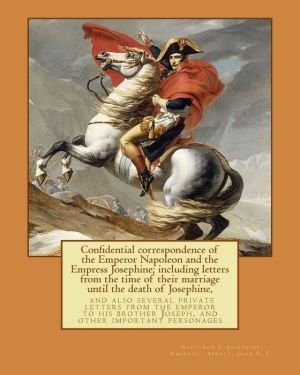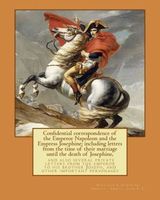- Welcome to FictionDB, Guest
- | My Account
- | Help

Confidential Correspondence of the Emperor Napoleon and the Empress Josephine; — Createspace
Napoleon Bonaparte (15 August 1769 â€" 5 May 1821) was a French military and political leader who rose to prominence during the French Revolution and led several successful campaigns during the French Revolutionary Wars. As Napoleon I, he was Emperor of the French from 1804 until 1814, and again briefly in 1815 (during the Hundred Days). Napoleon dominated European and global affairs for more than a decade while leading France against a series of coalitions in the Napoleonic Wars. He won most of these wars and the vast majority of his battles, building a large empire that ruled over continental Europe before its final collapse in 1815. One of the greatest commanders in history, his wars and campaigns are studied at military schools worldwide. Napoleon's political and cultural legacy has endured as one of the most celebrated and controversial leaders in human history.He was born Napoleone di Buonaparte (Italian: [napole'o?ne di bw?na'parte]) in Corsica, to a relatively modest family from minor Italian nobility. When the Revolution broke out in 1789, Napoleon was serving as an artillery officer in the French army. Seizing the new opportunities presented by the Revolution, he rapidly rose through the ranks of the military, becoming a general at age 24. The Directory eventually gave him command of the Army of Italy after he suppressed a revolt against the government from royalist insurgents. At age 26, he began his first military campaign against the Austrians and their Italian allies -- winning virtually every battle, conquering the Italian Peninsula in a year, and becoming a national hero. In 1798, he led a military expedition to Egypt that served as a springboard to political power. He engineered a coup in November 1799 and became First Consul of the Republic. His ambition and public approval inspired him to go further, and in 1804 he became the first Emperor of the French. Intractable differences with the British meant that the French were facing a Third Coalition by 1805. Napoleon shattered this coalition with decisive victories in the Ulm Campaign and a historic triumph over Russia and Austria at the Battle of Austerlitz, which led to the elimination of the thousand-year-old Holy Roman Empire. In 1806, the Fourth Coalition took up arms against him because Prussia became worried about growing French influence on the continent. Napoleon quickly defeated Prussia at the battles of Jena and Auerstedt, then marched the Grand Army deep into Eastern Europe and annihilated the Russians in June 1807 at the Battle of Friedland. France then forced the defeated nations of the Fourth Coalition to sign the Treaties of Tilsit in July 1807, bringing an uneasy peace to the continent. Tilsit signified the high watermark of the French Empire. In 1809, the Austrians and the British challenged the French again during the War of the Fifth Coalition, but Napoleon solidified his grip over Europe after triumphing at the Battle of Wagram in July......... Joséphine de Beauharnais ( 23 June 1763 â€" 29 May 1814) was the first wife of Napoleon I, and thus the first Empress of the French (commonly called Empress Josephine or just Josephine)... John Stevens Cabot Abbott (September 19, 1805 â€" June 17, 1877), an American historian, pastor, and pedagogical writer, was born in Brunswick, Maine to Jacob and Betsey Abbott.
Genres
Click on any of the links above to see more books like this one.

